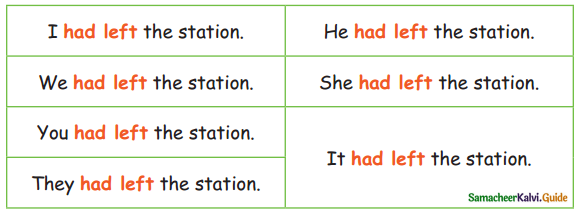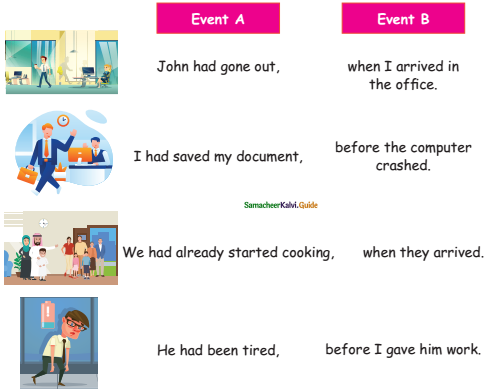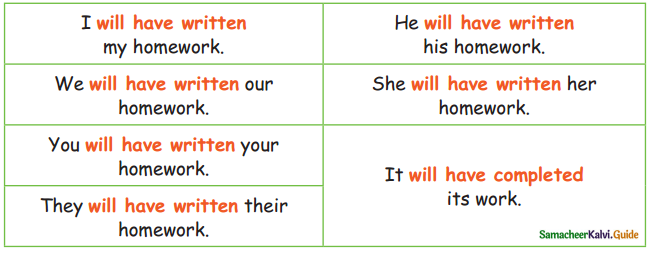Tamilnadu State Board New Syllabus Samacheer Kalvi 5th English Guide Pdf Term 3 Poem 3 Social Responsibility Text Book Back Questions and Answers, Summary, Notes.
Tamilnadu Samacheer Kalvi 5th English Solutions Term 3 Poem 3 Social Responsibility
5th English Guide Social Responsibility Text Book Back Questions and Answers
A. Answer the following questions:
Question 1.
When does the world become green?
Answer:
The world becomes green when we keep our surroundings clean.
Question 2.
Who is responsible for society?
Answer:
Everyone is responsible for society.
Question 3.
When do you feel proud?
Answer:
I feel proud when I keep the surroundings clean, putting the litter in a trash can.
Question 4.
What should we vow for?
Answer:
We should vow to do social welfare.
Question 5.
Are you the first to protect nature?
Answer:
Yes.
![]()
B. Pick out the rhyming words and write:
Question 1.
| 1.green | |
| 2.human | |
| 3.will | |
| 4.welfare |
Answer:
| 1.green | a. clean |
| 2.human | b. can |
| 3.will | c. ill |
| 4.welfare | d. care |
![]()
Let Us Know:
Past Perfect Tense (கடந்தகால வினைமுற்று):
The past perfect tense is used to show that something happened before another action in the past.
கடந்த காலத்தில் ஒரு செயலுக்கு முன்பே இன்னொரு செயல் நடந்து முடிந்து விட்டதை குறிப்பது கடந்தகால வினைமுற்று ஆகும். It can also be used to show that something happened before a specific time in the past.
We know the forms of the verbs, they are:

The past participle form is used in past perfect tense with auxiliary had.

![]()
A. Fill in the blanks:
Example:
I had given him the book.
Question 1.
We ______ to the park. (go)
Answer:
We had gone to the park.
Question 2.
You ______ to your uncle’s house. (be)
Answer:
You had been to your uncle’s house.
Question 3.
He ______ before 5 ‘o’ clock. (sleep).
Answer:
He had slept before 5 ‘o’clock.
Question 4.
She ______ the bill. (pay)
Answer:
She had paid the bill.
Question 5.
They ______ him before the party. (meet)
Answer:
They had met him before the party.
Question 6.
It ______ before I touch it. (break)
Answer:
It had broken before I touched it.
![]()
Let us see when to use past perfect tense:
Event happened before another in the past:

![]()
B. Complete the following sentences using past perfect tense:
Question 1.
The bus _____ the bus stop before I went. (leave)
Answer:
The bus had left the bus stop before I went.
Question 2.
The exam _____ when I reached the exam hall. (start)
Answer:
The exam had started when I reached the exam hall.
Question 3.
She _____ the apple as I told her to stop. (eat)
Answer:
She had eaten the apple as I told her to stop.
Question 4.
The satellite ______ on the moon before they gave the command. (land)
Answer:
The satellite had landed on the moon before they gave the command.
Question 5.
Raju ______ to the ground before others arrived. (arrive)
Answer:
Raju had arrived to the ground before others arrived. (arrive)
![]()
Future Perfect Tense (எதிர்கால வினைமுற்று):
Future perfect tense is used for actions that will be completed before some other point in the future.
எதிர்காலத்தில் ஒரு செயலை முடிப்பதற்கு முன்னால், இன்னொரு செயலை செய்து முடிக்கப்போவதை குறிப்பது எதிர்கால வினைமுற்று ஆகும்.

The past participle form is used in future perfect tense with auxiliary will have. Come let us use it:

![]()
A. Fill in the blanks using future perfect tense:
Example :
I will have reached the place by 6 pm.
Question 1.
We ______ the painting by tomorrow. (complete)
Answer:
We will have completed the painting by tomorrow.
Question 2.
You ______ the match by this time tomorrow. (win)
Answer:
You will have won the match by this time tomorrow.
Question 3.
They ______ everyone to the marriage by next week. (invite)
Answer:
They will have invited everyone to the marriage by next week.
Question 4.
He ______ all the money within an hour. (spend)
Answer:
He will have spent all the money within an hour.
Question 5.
She ______ job in America by next year. (get)
Answer:
She will have got job in America by next year.
Question 6.
It ______ all the candies. (eat)
Answer:
It will have eaten all the candies.
![]()
B. Mark (✓) if it is past perfect tense or (x) Future perfect tense:
Question 1.
I had gone to my grandma’s home.
Answer:
(✓) Past perfect
Question 2.
The boy will have grown up like a man in a few years.
Answer:
(X) Future perfect
Question 3.
She will have made the cake by 8 ‘o’clock.
Answer:
(X) Future perfect
Question 4.
They had cooked the vegetables.
Answer:
(✓) Past perfect
Question 5.
Muthu will have returned from Srilanka by next month.
Answer:
(X) Future perfect.
![]()
C. Change the sentence into past perfect tense and future perfect tense:
Question 1.
I have posted the letter.
Answer:
Past perfect: I had posted the letter.
Future perfect: I will have posted the letter.
Question 2.
She has bought a violin.
Answer:
Past perfect: She had bought a violin.
Future perfect: She will have bought a violin.
Question 3.
Akash has jumped into the well.
Answer:
Past perfect: Akash had jumped into the well.
Future perfect: Akash will have jumped into the well.
Question 4.
We have built a house in our village.
Answer:
Past perfect: We had built a house in our village.
Future perfect: we will have built a house in our village.
Question 5.
They have cooked their meal.
Answer:
Past perfect: They had cooked the meal.
Future perfect: They will have cooked the meal.
![]()
D. Fill the sentences with the appropriate Auxilliary:
(had), (will have)
Question 1.
Maha ______ asked a question to his father.
Answer:
Maha had asked a question to his father.
Question 2.
She ______ attended the meeting by tomorrow.
Answer:
She will have attended the meeting by tomorrow.
Question 3.
The fly ______ sat in the food before she covered it.
Answer:
The fly had sat in the food before she covered it.
Question 4.
Niru ______ joined her family in 2 years.
Answer:
Niru will have joined her family in 2 years.
Question 5.
The book ______ won him the award.
Answer:
The book had won him the award.
![]()
Let us listen:
Listen to the audio and tick (✓) if the statements are true:
Question 1.
Chennai is the fourth largest city in India to receive more rain.
Answer:
True
Question 2.
The airport is not closed.
Answer:
False
Question 3.
People were not able to get their food.
Answer:
True
Question 4.
The power supply in many areas is normal.
Answer:
False
Question 5.
It rained because of a depression in Bay of Bengal.
Answer:
True
![]()
Let us speak:
Storry Telling:
The following steps are involved in Story-telling:
Step 1: Choose the story you want to tell.
Step 2: Tell the place where the story is happening.
Step 3: Tell who the characters are.
Step 4: Tell three events that lead to the end of the story.
Step 5: End the story.
Example:
The Ant and the Grasshopper:

In a deep forest near the mountains, lived an ant and a grasshopper. The ant worked hard in the summer and saved food for the winter. The grasshopper played in the Sun without collecting food. The grasshopper always called the ant to play, but the ant wanted to save food for winter. It was now winter, the ant had food to eat but the grasshopper did not. We should work hard and save.
Try to tell your friend a story on your own.
![]()
5th English Guide Social Responsibility Additional Questions and Answers
I. Answer the following:
Question 1.
List any four social responsibility given in the poem.
Answer:
- Keep your surroundings clean.
- Save electricity and do not waste.
- Put the litter in the trash can.
- Take care of nature.
II. Story telling:
Title: Wise King Solomon
King Solomon was known for his wisdom. Queen Sheeba wanted to test his wisdom. She took two identical flower garlands to Solomon. One was real and the other a paper garland. She asked the king to identify the real one. Solomon asked to open the windows. Soon a swarm of bees settled on the real garland. Solomon handed the real garland to Sheeba and she was happy.
![]()
Social responsibility Summary in English and Tamil
Our world becomes green,
When you keep the surroundings clean.
All of us are responsible for our society,
To take care of it is our duty.
Be proud of yourself as a human,
When you put the litter in a trash can.
Reduce the use of electricity by will,
And help the Earth grow without any
All should vow to do social welfare,
I will start with nature’s care.
நம் உலகம் பச்சை பசேல் என மாறுகிறது,
சுற்றுப்புறத்தை நீங்கள் சுத்தமாக வைத்திருக்கும்
போது நமது சமுதாயத்திற்கு நாம் அனைவரும் பொறுப்பானவர்கள்
அதை கவனித்துக் கொள்வது நமது கடமை.
ஒரு மனிதர் என்பதற்காக உங்களைப் பற்றி பெருமிதம் கொள்ளுங்கள்,
நீங்கள் குப்பையை அதற்கான குப்பைத்தொட்டியில் போடும் போது.
மின்சார பயன்பாட்டை ஓர் உறுதியுடன்,
குறையுங்கள் எந்த பாதிப்பும் இல்லாமல் இந்த பூமி வளர.
உதவுங்கள் சமூக நலனுக்கு ஏதேனும் செய்ய அனைவரும் உறுதிமொழி எடுப்போம்,
இயற்கையை பாதுகாத்து பராமரிப்பதுடன் நான் தொடங்குவேன்.
![]()
Social responsibility Glossary:
Litter – Waste (குப்பை)
Proud – Glad (பெருமிதம், மகிழ்ச்சி)
Reduce – Make something less (குறைத்தல்)
Responsible – In charge of (பொறுப்பு)
Society – Community (சமுதாயம்)
Trash can – Dust bin (குப்பைத் தொட்டி)
Vow – Pledge, promise (உறுதி மொழி)
Welfare – Comfort and security (பொதுநலன்)
Will – Determination (உறுதி)